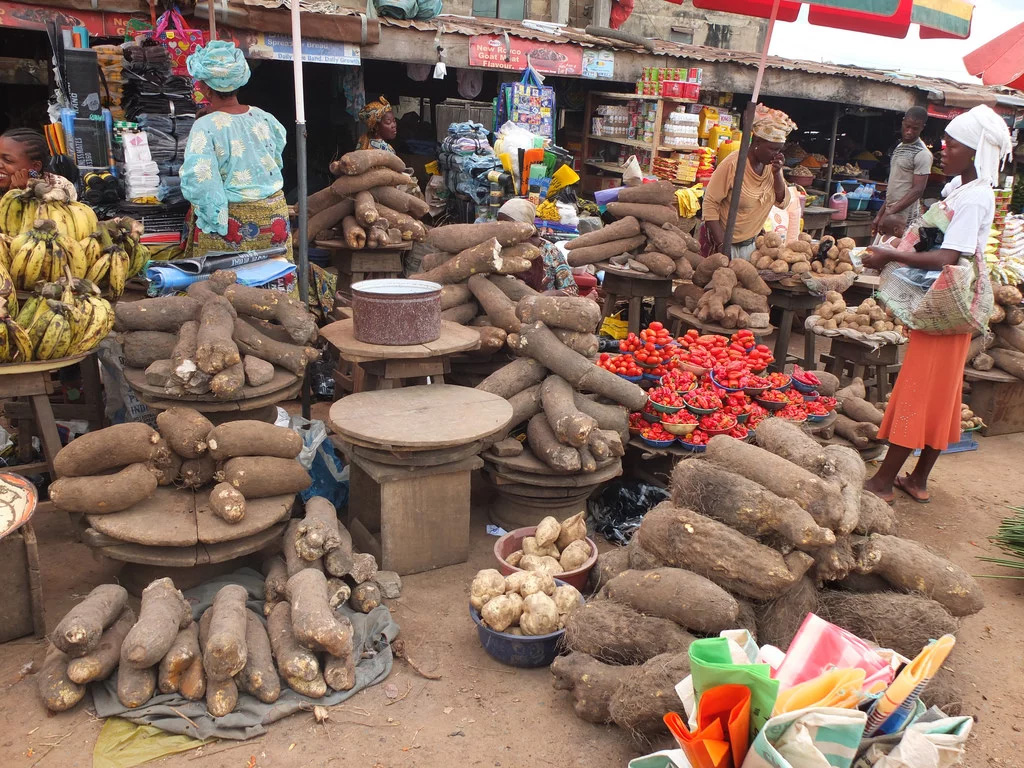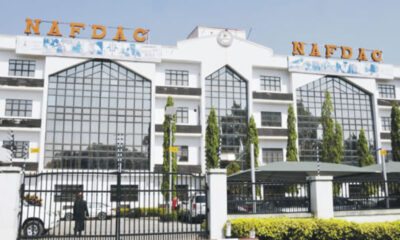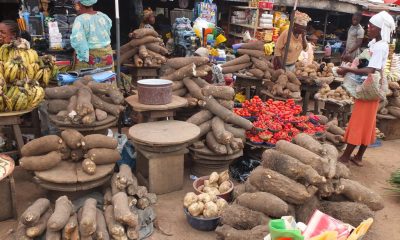Business
N30k for bag of rice, crate of eggs now N2k… traders grapple with low sales amid rising food prices

The prices of food items continue to soar across major markets in Lagos, as traders complained of low sales amid declining purchasing power.
This is according to a market survey conducted by The Cable.
Recently, the Food and Agricultural Organisation (FAO) warnedthat global import bills could reach record levels in 2021 — a 14 percent jump from the 2020 record.
The food outlook report said the spike in global food prices would weigh heavier on the side of low-income countries like Nigeria.
Joseph Aleekwe, an elderly trader, who started his business with N7000 in the 1990s at the Alaba Rago market, Lagos, reminisced on “good old days” when he started trading.
“I started my business with N7000. I rented a shop and stocked my shop with food items with that amount of money,” he said.
“But today, N7000 cannot even buy a bag of wheat.”
Aleekwe’s claim was correct as the price of a bag of wheat now sells at N17,000, a 21.43 percent jump from N14,000 previous months.
READ ALSO:
- Thousands dump APC for PDP in Benue, apologize to Gov Ortom
- Buhari has a duty to release Nnamdi Kanu, no need to beg him – Nzuko Ndigbo
- Oyo Muslims threaten to sue over use of Hijab in public schools
PRICES INCREASE EVERY DAY – TRADERS
For traders at the popular Iyana Iba market, most prices of food items have escalated in the last few months, thereby diminishing purchasing power with them witnessing low sales return.
“The prices of items increase every day. If you come to the market tomorrow, you will not get the same price you will get today,” some of the traders said.
“We don’t know what will happen as we are entering a festive season now. For most of us, we are even looking at how to get more money to buy items and sell during the season.”
EGG JUMPED BY 67%, RICE 20%
The price of local rice (50 kilogrammes), which used to be N20,000 in the first half of the year — rising by 15 percent — increased to N23,000.
Foreign-made rice (50kg), on the other hand, surged from N25,000 in the first half of the year to N30,000, signifying a 20 percent increase.
Also, vegetable oil (25 litres) had a market price of N23,000 but increased to N25,000, up by 8.7 percent.
A crate of medium-sized eggs jumped from N1200 to N2000, year-on-year, representing a 67 percent increase.
A big basket of tomatoes was N19,000, with a small basket traded for N4500. A 10kg size of semo went from N4800 to N5300, while a bag of corn that used to be between N8000 and N9000 doubled its price to about N19,000 and N22,000.
A loaf of bread also recorded an increase in price from N350 last year to N500 in 2021. A bag of garri was purchased at N12,500 — increasing by 4% — from N12,000 recorded in the same month, the previous year.
A bag of groundnuts increased from N48,000 in October to N52,000 in November.
A carton of croaker fish is now N30,000, and a medium-sized frozen chicken (full) rose from N1,700 in October and N1,500 in November 2020 to N2,000 in November.
COST OF BEANS DROPPED
A bag of brown beans — was 80,000 in October — decreased to N65,000, representing 18.75 percent drop. Despite the fall, the price represented a 62.50 percent surge compared to November 2020, when the price was N40,000.
The selling price of a bag of white beans also decreased by 0.08 percent from N60,000 in October to N55,000 in November. It was 30.95 percent higher than the purchasing price of N42,000 in the preceding year.
Also, one derica of beans (four tins) fell from N700 to about N550.
Shansu Salisumukhtar, a trader at Alaba Rago market, told TheCable that the decline in the prices — after it soared to N100,000 earlier in the year — could be attributed to the inflow of newly-harvested beans into Nigerian markets.
“New beans is in the market… that is why the price is going down,” he said.
The Cable
Railway
Lagos Rail Mass Transit part of FG free train ride – NRC

Lagos Rail Mass Transit part of FG free train ride – NRC
The Nigerian Railway Corporation (NRC) has disclosed that the Lagos Rail Mass Transit (LRMT) trains are included in the Federal Government’s free train ride initiative for the Christmas and New Year celebrations.
The LRMT, which currently includes the Phase 1 Blue Line Rail and the Phase 1 of the Red Line Rail, operates under the Lagos Metropolitan Area Transport Authority (LAMATA).
This announcement was made by Ben Iloanusi, the Acting Managing Director of the NRC, during an interview on NTA News TV on Friday, following the launch of the initiative earlier that day.
While Iloanusi stated that Phase 1 of both the Blue Line and Red Line Rail projects are part of the program, LAMATA has yet to confirm this inclusion.
READ ALSO:
- Nigeria denies alleged plot to destabilise Niger Republic
- Navy arrests 19 Nigerians attempting to reach Europe by hiding on ship
- Troops arrest four Ambazonian rebels in Taraba
Iloanusi outlined the other routes benefiting from the scheme, which include the Lagos-Ibadan Train Service, Kaduna-Abuja Train Service, Warri-Itakpe Train Service, Port Harcourt-Aba Train Service, and the Bola Ahmed Tinubu Mass Transit in Lagos. Notably, little was previously known about the Bola Ahmed Tinubu Mass Transit service until this disclosure.
“Let me mention the routes where this free train service is happening. We have the Lagos-Ibadan Train Service, we have the Kaduna-Abuja Train Service, we have the Warri-Itakpe Train Service, we have the Lagos Rail Mass Transit trains, we have the Port Harcourt-Aba Train Service, and we have what we call the Bola Ahmed Tinubu Mass Transit, which is also in Lagos,” he stated.
Iloanusi provided operational updates, stating that passengers nationwide can access free tickets online or, for those unable to do so, at train stations where they will be profiled and validated.
He noted that passengers using NRC-managed services (excluding the Lagos Rail Mass Transit) should reserve tickets via the official website, www.nrc.gov.ng, with a valid ID required. He also advised travelers to plan, arrive on time, and bring valid identification.
Lagos Rail Mass Transit part of FG free train ride – NRC
Business
NNPC denies claim of Port Harcourt refinery shutdown

NNPC denies claim of Port Harcourt refinery shutdown
The Nigerian National Petroleum Company Limited (NNPCL) has denied claims in media reports that the newly refurbished Port Harcourt refinery has shut down.
The national oil company denied the claim in a press release issued by its Chief Corporate Communications Officer, Olufemi Soneye, on Saturday.
Soneye said the claim was false and urged Nigerians to disregard it. He stressed that the Port-Harcourt Refinery is fully operational.
READ ALSO:
- Like Ibadan, stampede claim 10 lives for Abuja Catholic church, 17 in Anambra
- Marketers react after NNPCL slashes petrol price to N899 per litre
- Electricity: We installed 184,507 meters, issued 50 licences in Q3, says FG
The statement read, “The attention of the Nigerian National Petroleum Company Limited (NNPC Ltd.) has been drawn to reports in a section of the media alleging that the Old Port Harcourt Refinery which was re-streamed two months ago has been shut down.
“We wish to clarify that such reports are totally false as the refinery is fully operational as verified a few days ago by former Group Managing Directors of NNPC.”
He noted that preparation for the day’s loading operation is currently ongoing, and added that claims of the shutdown are “figments of the imagination of those who want to create artificial scarcity and rip-off Nigerians.”
NNPC denies claim of Port Harcourt refinery shutdown
Business
CBN permits BDCs to buy up to $25,000 FX weekly from NFEM

CBN permits BDCs to buy up to $25,000 FX weekly from NFEM
The Central Bank of Nigeria (CBN) has granted Bureau de Change (BDC) operators temporary permission to purchase up to $25,000 weekly in foreign exchange (FX) from the Nigerian Foreign Exchange Market (NFEM).
The Central Bank of Nigeria (CBN) has granted Bureau de Change (BDC) operators temporary permission to purchase up to $25,000 weekly in foreign exchange (FX) from the Nigerian Foreign Exchange Market (NFEM).
This move, detailed in a circular dated December 19, 2024, is designed to meet seasonal retail demand for FX during the holiday period.
The circular was signed by T.G. Allu, on behalf of the Acting Director of the Trade and Exchange Department.
The arrangement will be in effect from December 19, 2024, to January 30, 2025.
Under the directive, BDCs may purchase FX from a single Authorized Dealer of their choice, provided they fully fund their accounts before accessing the market.
Transactions to occur at the prevailing NFEM rate
The transactions will occur at the prevailing NFEM rate, and BDCs are required to adhere to a maximum 1% spread when pricing FX for retail end-users.
READ ALSO:
- Badenoch’s negative portrayal of Nigeria Police unfair-PCRC
- Bitcoin price crashes to $95,000 as market continues to react to Federal rate cuts
- Bauchi high court dismisses blasphemy, cybercrime charges against Rhoda Jatau
All transactions conducted under this scheme must be reported to the CBN’s Trade and Exchange Department.
The circular read in part:
“In order to meet expected seasonal demand for foreign exchange, the CBN is allowing a temporary access for all existing BDCs to the NFEM for the purchase of FX from Authorised Dealers, subject to a weekly cap of USD 25,000.00 (Twenty-five thousand dollars only).
This window will be open between December 19, 2024 to January 30, 2025.
“BDC operators can purchase FX under this arrangement from only one Authorized Dealer of their choice and will be required to fully fund their account before accessing the market at the prevailing NFEM rate. All transactions with BDCs should be reported to the Trade and Exchange department, and a maximum spread of 1% is allowed on the pricing offered by BDCs to retail end-users.”
The CBN assured the general public that PTA (Personal Travel Allowance) and BTA (Business Travel Allowance) remain available through banks for legitimate travel and business needs.”
These transactions are to be conducted at “market-determined exchange rates” within the NFEM framework.
This initiative reflects the CBN’s strategy to stabilize the FX market and manage seasonal surges in demand.
CBN permits BDCs to buy up to $25,000 FX weekly from NFEM
-

 Railway8 hours ago
Railway8 hours agoLagos Rail Mass Transit part of FG free train ride – NRC
-

 metro1 day ago
metro1 day agoCourt stops customs from seizing imported rice in open market
-

 metro2 days ago
metro2 days agoFG transfers electricity market regulatory oversight in Lagos to LASERC
-

 metro2 days ago
metro2 days agoAfe Babalola: Court grants Dele Farotimi bail, barred from media interviews
-

 News2 days ago
News2 days agoAdebayo Ogunlesi, 2 other Nigerians make Forbes 50 wealthiest Black Americans list 2024
-

 metro2 days ago
metro2 days agoIbadan stampede: Tinubu orders probe as death toll hits 40
-

 metro3 days ago
metro3 days agoAbuja demolition: Soldiers attack FCTA officials, seize vehicles
-

 metro1 day ago
metro1 day agoNAFDAC seizes N5bn fake rice, seals factory in Nasarawa











